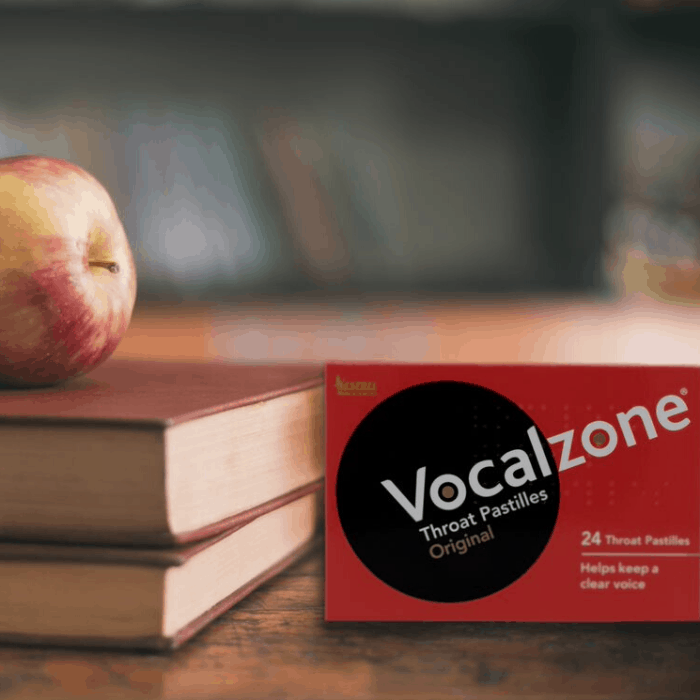Classrooms can be hectic places to say the very least. On top of the classroom management, endless hours of planning and marking of pupils work, and the dreaded parents evening, teachers are constantly projecting their voices to teach, control, educate and communicated with classes of 20-30 students, potentially even more when considering higher education such as university and college tutors and lecturers! Coupled with a lack of acoustic design in most classroom environments, artificial heating (and cooling systems… if you’re lucky), and very brief and largely inadequate training on voice care when studying to become a teacher, it’s no wonder voice care problems within the teaching profession are high; 32 times higher than non teaching professions according to some reports.
In this short guide we will be talking about how teachers can better look after their voices with our very own list of hints and tips, so that together we can start to reverse the trend of vocal discomfort, and in extreme cases long lasting vocal damage which has become increasingly commonplace in teachers lives.
Posture
Posture is key to anyone who relies upon their voice, so that naturally includes teachers. When people usually talk about posture we always assume this silhouette of a broad chested, arms straight down and chin assertively up empowered being… a superhero of sorts. Whilst it’s important to retain a good posture because this allows you to project your vice with greater ease, it’s equally important that your muscles are relaxed; take for example your neck; people have a tendency to lock their neck in place by stiffening their neck muscles, which in turn means an unnecessary added tension is being created in your neck area making your voice work even harder. Make sure to loosen those neck muscles!
Warm Ups
You’ll never see a proficient athlete jumping straight into sports without a warm up, and as the voice is a muscle just like the rest of the muscle in our body, it too needs to be warmed up prior to extensive and/or more intensive use. Time is an issue, we completely understand, but the repercussions for not warming up your voice are very clear. You are greatly increasing the chances of losing it, just like the athlete who doesn’t warm up properly and feels a tight muscle. Besides, not all warm ups have to take long, and they can easily be completed as part of a morning routine to save you time. Check out the straw exercise below. We find this exercise particularly useful for teachers. Other warm ups to explore include gentle humming and the yawn-sighing exercise.
Environment
Aside from the physical obstacles that classrooms can present for vocal wellbeing, there is also an increased risk of catching an infection from the spread of germs from being in close contact with people for extensive amounts of the day. The reality is that there is no way to eliminate this risk; especially not in a classroom. However mitigating the risk with hand sanitiser is always sensible. If you are unlucky enough to catch a bug, make sure to take the time to rest up properly, and that also includes limiting or not using your voice. This can be as minor as a sore throat, but sore throat can very quickly evolve into an underlying problem. Granted, there are pressures to go into work as often as possible across all professions, and anaesthetic based voice care remedies may seem like the simple answer to getting into work, but in the long term, there is an increased chance of furthering the damage by initially masking it under the veil of Benzocaine or similar numbing agents.
Breathing Exercises
Breathing exercises have multiple uses in the world of teaching. Whilst mostly a means to help keep calm and reduce anxieties, breathing exercises can also help increase your lung capacity – something which is extensively done by performers. Ok, you may not be breaking into song and dance unless you work in the performing arts department; but look at this two ways. One, any exercises you do are going to help further strengthen the muscles required to use your voice, just like going to a gym to increase our fitness levels. Two, think of yourself as a marathon runner and a performer as a short distance sprinter. You may not be belting out melodies for an intensive yet relatively short session; just like a 100m sprint, but you are using your voice less aggressively over a much longer period of time which does accumulate into strain. Both disciplines require strength and conditioning of the muscles; albeit for very different uses.
No Caffeine
It pains us to say, but caffeine can easily be one of the worst offenders for causing vocal problems for teachers – its widely documented drying properties can be detrimental for your throat which mean you’re more likely to strain your voice when using it. If possible, why not try replacing your coffee with caffeine free herbal tea or a similar alternative? For that extra energy boost nuts, berries and B vitamins are a perfect replacement! If you simply can’t give up your coffee, make sure to remain hydrated, to compensate for the dryness that drinking caffeine based drinks can lead to. It is recommended that we all drink a minimum of 2 litres of water per day.
